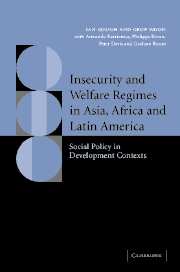 Insecurity and Welfare Regimes in Asia, Africa and Latin America
Insecurity and Welfare Regimes in Asia, Africa and Latin America Book contents
- Frontmatter
- Contents
- List of maps
- List of figures
- List of tables
- List of authors
- Acknowledgements
- List of abbreviations
- Glossary
- Introduction
- Part I Understanding insecurity and welfare regimes in the South: an analytical framework
- Part II Regional regimes
- Part III Regimes in global context
- 7 Rethinking the welfare regime approach in the context of Bangladesh
- 8 Multi-tiered international welfare systems
- Conclusion : Rethinking social policy in development contexts
- References
- Index
8 - Multi-tiered international welfare systems
Published online by Cambridge University Press: 04 August 2010
- Frontmatter
- Contents
- List of maps
- List of figures
- List of tables
- List of authors
- Acknowledgements
- List of abbreviations
- Glossary
- Introduction
- Part I Understanding insecurity and welfare regimes in the South: an analytical framework
- Part II Regional regimes
- Part III Regimes in global context
- 7 Rethinking the welfare regime approach in the context of Bangladesh
- 8 Multi-tiered international welfare systems
- Conclusion : Rethinking social policy in development contexts
- References
- Index
Summary
Introduction
The research programme from which this book derives has a number of conceptual roots. One is the notion of a ‘welfare regime’, made fashionable by writers such as Esping-Andersen, in the context of his analysis of OECD countries in general, Western Europe in particular (Esping-Andersen 1990). Previous chapters of this book have taken this concept and explored its applicability to a range of developing countries, in South Asia, sub-Saharan Africa, East Asia and Latin America. They demonstrate that the concept of a welfare regime can be applied fruitfully to many of those countries, even if in some important respects it must be revised.
Here I want to start from that same point of reference – the analysis by social policy scholars of the welfare regimes of Western Europe – but I want to take off in a different if complementary direction. I want to consider not the national welfare regimes of Western Europe, but the dynamic relationships of those regimes to their international environment. The foregoing chapters have examined how far an analysis of European welfare regimes provides specific insights into the national welfare regimes of the developing world: I want now to ask whether an analysis of the European welfare regimes in relation to their international environment also provides insights, but now into the corresponding relationships between the welfare regimes of the developing world and their international environment.
- Type
- Chapter
- Information
- Insecurity and Welfare Regimes in Asia, Africa and Latin AmericaSocial Policy in Development Contexts, pp. 287 - 311Publisher: Cambridge University PressPrint publication year: 2004
- 1
- Cited by


